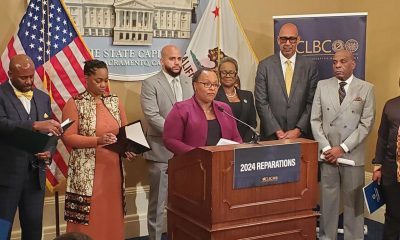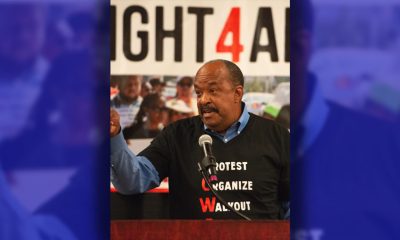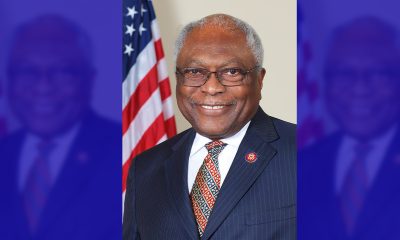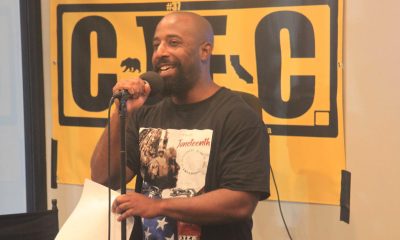#NNPA BlackPress
COMMENTARY: Biblical silence about slavery leaves lasting questions today
NNPA NEWSWIRE — ‘By the mid 19th Century, the majority of slaves had been introduced to Christianity, although most still could not read the Bible based on illiteracy and the fact that in several states in the Deep South, the White aristocracy discouraged Black persons from meeting in prayer. In 1832, the Rev. Charles Colcock Jones published the book “How To Make A Negro Christian,” a sort of guide to slave owners on how to introduce the precepts of Jesus while instilling abject servitude upon their property.
By Merdies Hayes, Our Weekly News Editor
The little girl was guilty of nothing more than hunger. When she was denied sustenance, she made the fatal mistake of demonstrating insolence, and for that infraction, her punishment appeared inconceivable. But it happened.
The St. Louis Republican newspaper ran a article in the fall of 1844 recounting the flogging and heinous treatment that led to the death of an 8-year-old child:
“On Friday last, the coroner held an inquest at the house of Judge Dunica, a few miles south of the city, over the body of a Negro girl, about 8 years of age, belonging to Mr. Cordell. The body exhibited evidence of the most cruel whipping and beating we have ever heard of. The flesh on the back and limbs were beaten to a jelly—one shoulder-bone was laid bare—there were several cuts, apparently from a club, on the head—and around the neck was the indentation of a cord, by which it is supposed she had been confined to a tree.
A brutal fate for a child
“She had been hired by a man by the by the name of Tanner, residing in the neighborhood, and was sent home in this condition. After coming home, her constant request, until her breath, was for bread, by which it would seem that she had been starved as well as unmercifully whipped. The jury returned a verdict that she came to her death by the blows inflicted by some persons unknown whilst she was in the employ of Mr. Tanner. Mrs. Tanner (an eyewitness) has been tried and acquitted.”
Records reveal that a slave named Cornelia was charged with being an accomplice of Mrs. Tanner in the murder of the little girl. In admitting her participation, Cornelia said she was “compelled to take part” in the murder and said Mrs. Tanner ordered her to restrain the child while she tied the girl to a tree. She was held there for five days and they denied the girl any food or water. The child was whipped each day and forced to lie bloodied and convulsing throughout the night until she was eventually returned to her master and died from her injuries.
Many Christians would naturally wonder what would Jesus say about this form of brutality perpetrated against a child? Jesus was a great reformer, and he certainly identified with the poor and downtrodden and has urged his followers for two millennia to do the same. During the time when the Holy Land was occupied by foreign power, Jesus taught his countrymen how to maintain their dignity. For instance, when religious leaders were corrupt, he called them into account.
Why was Jesus silent about slavery?
But Jesus never spoke a single word against slavery. And although it would take roughly 2,000 years until most of the world would realize how immoral slavery is, Jesus knew then that slave-owners would use the Old Testament to justify the practice. Many people believe that one clear word from Jesus condemning slavery could have prevented the misery of millions of people. So why didn’t he speak out against it?
Slavery was brutal, and Jesus knew that full well. Because he never condemned the practice, people might hope that he thought of it in relatively benign forms that are sometimes found in the Old Testament. Not exactly. When Jesus spoke about the relationship between slaves and masters, he relied on the fact that violence and abuse against captives were the order of the day.
A typical example of this might found in Luke 12:47-48: “The servant who knows the master’s will and does not get ready or does not do what the master wants will be beaten with many blows. But the one who does not know and does things deserving punishment will be beaten with few blows.”
When Jesus conducted his ministry, it was widely believed that such outcomes would be the result of certain methods to, in other words, “scare people” into submission to God. Like the slave or servant, we would be physically harmed if we’re not good enough. There are several parables like this in the Gospels. Matthew 18:23-35 says we will be “jailed and tortured.” Matthew 25:14-30 says we will be “cast into the other darkness where there will be weeping and gnashing of teeth.” The Book of Matthew goes even further in chapter 24, verses 45-51 in that the disobedient servant/slave will be “cut in pieces.” These excerpts from Scripture may indicate how Jesus pictured masters treating their slaves.
Following the ‘Golden Rule’
When Jesus gave the Golden Rule (“love your neighbor as yourself”) or (do to others what you would have them do to you”), most people naturally believe he implied that slavery was wrong. In other words, if we should treat others as we want them to treat us, that means that we shouldn’t enslave them. While this is obvious in the 21st Century—and had even become clear to abolitionists in the 19th Century—this ideal was not obvious to large swaths of those who would abide by America being “founded as a Christian nation.”
Jesus did not invent the Golden Rule. Rather, he was quoting from verse 18 of the passage in Leviticus 19:11-18 where the same principle, “love your neighbor as yourself” effectively sums up the other commands in that passage. This is much like how Jesus said that the Golden Rule sums up the “law and the prophets” (Matthew 7:12 and Matthew 22:36-40). At that time, Jesus’ audience would have known that he was quoting from Leviticus, one of the Five Books of Moses (the Torah), which commanded Israel to “invade and enslave distant cities,” and, in particular, Exodus which said that slaves are merely property and may be severely beaten “for just shy of two days” when their behavior would merit such a response.
In the minds of Jesus’ audience, it would have been far from obvious that the Golden Rule outlawed slavery because the two concepts had coexisted in the Scriptures—presumably without contradiction—for centuries. At a minimum, modern civilization could say that if Jesus meant the Golden Rule as a command to abolish slavery, then millions of slaves in the next 2,000 years would have wished he had made his intent far more obvious.
‘How to Make A Negro Christian’
‘By the mid 19th Century, the majority of slaves had been introduced to Christianity, although most still could not read the Bible based on illiteracy and the fact that in several states in the Deep South, the White aristocracy discouraged Black persons from meeting in prayer. In 1832, the Rev. Charles Colcock Jones published the book “How To Make A Negro Christian,” a sort of guide to slave owners on how to introduce the precepts of Jesus while instilling abject servitude upon their property.
Jones was popularly referred to as the “Apostle of the Blacks.” In one passage from his book, he explained how the typical slave owner could use Scripture to hold sway over his captives:
“And having our plantation, the time and persons of our servants wholly under our control, we can arrange the manner and frequency of our instructions, as we please, and the period of these instructions with as much punctuality, and with as little interruption, as we can arrange the morning and evening devotions of our own fireside. Our very children might become, to some extent, teachers, by reading to them plain portions of the Bible, or plain tracts and things of such sort.”
Further, Jones elaborated on why teaching the Gospels to slaves would make them even more obedient and diligent in their daily chores: “Will the authority of the masters be weakened by instructions of this sort? No, it will be strengthened. And we believe that their authority can be strengthened and supported in this way only; for the duty of obedience will never be felt and performed to the extent that we desire it, unless we can bottom it on religious principle. Let them (slave masters) invest a little capital in the minds and hearts of their people (slaves), and it will prove to all concerned, a peace-giving and profitable investment for time and for eternity.”
A ‘double-edged sword’ for African Americans
Some slave owners, however, did not allow their slaves to attend church and ridiculed the notion of religion for slaves because they refused to believe that Black persons had souls. Others forbade their slaves to attend church because, according to John Brown, an ex-slave from Georgia: “White folks ‘fraid the nig*rs git to thinkin’ they was free, if they had churches ‘n things.”
The Christian faith occupies a complicated—and often radicalized—place in the history of African-Americans, namely because it was abused by White colonists and slave traders to subjugate generations of people.
Many scholars have since tried to explain the dichotomy between the brutality of slavery and the benevolence of the Gospels.
“Christianity was a double-edged sword [for African Americans],” said Dr. Lawrence H. Mamiya, co-author of the 1990 book “The Black Church in the African-American Experience.” He explained that long before colonialism and slavery, Africans were practicing Christianity. “On the one hand, Whites wanted to use Christianity to make slaves docile and obedient. On the other, the Africans adapted Christianity for their survival and liberation.”
#NNPA BlackPress
Beloved Actor and Activist Louis Cameron Gossett Jr. Dies at 87
NNPA NEWSWIRE — Louis Gossett Jr., the groundbreaking actor whose career spanned over five decades and who became the first Black actor to win an Academy Award as Best Supporting Actor for his memorable role in “An Officer and a Gentleman,” has died. Gossett, who was born on May 27, 1936, in Brooklyn, N.Y., was 87. Recognized early on for his resilience and nearly unmatched determination, Gossett arrived in Los Angeles in 1967 after a stint on Broadway.
The post Beloved Actor and Activist Louis Cameron Gossett Jr. Dies at 87 first appeared on BlackPressUSA.

By Stacy M. Brown
NNPA Newswire Senior National Correspondent
@StacyBrownMedia
Louis Gossett Jr., the groundbreaking actor whose career spanned over five decades and who became the first Black actor to win an Academy Award as Best Supporting Actor for his memorable role in “An Officer and a Gentleman,” has died. Gossett, who was born on May 27, 1936, in Brooklyn, N.Y., was 87. Recognized early on for his resilience and nearly unmatched determination, Gossett arrived in Los Angeles in 1967 after a stint on Broadway.
He sometimes spoke of being pulled over by law enforcement en route to Beverly Hills, once being handcuffed to a tree, which he remembered as a jarring introduction to the racial tensions of Hollywood. In his memoir “An Actor and a Gentleman,” Gossett recounted the ordeal, noting the challenges faced by Black artists in the industry. Despite the hurdles, Gossett’s talent shone brightly, earning him acclaim in groundbreaking productions such as “A Raisin in the Sun” alongside Sidney Poitier. His Emmy-winning portrayal of Fiddler in “Roots” solidified his status as a trailblazer, navigating a landscape fraught with racial prejudice.
According to the HistoryMakers, which interviewed him in 2005, Gossett’s journey into the limelight began during his formative years at PS 135 and Mark Twain Junior High School, where he demonstrated early leadership as the student body president. His passion for the arts blossomed when he starred in a “You Can’t Take It With You” production at Abraham Lincoln High School, catching the attention of talent scouts who propelled him onto Broadway’s stage in “Take A Giant Step.” His stellar performance earned him the prestigious Donaldson Award for Best Newcomer to Theatre in 1952. Though initially drawn to sports, Gossett’s towering 6’4” frame and athletic prowess led him to receive a basketball scholarship at New York University. Despite being drafted by the New York Knicks in 1958, Gossett pursued his love for acting, honing his craft at The Actors Studio under the tutelage of luminaries like John Sticks and Peggy Fury.
In 1961, Gossett’s talent caught the eye of Broadway directors, leading to roles in acclaimed productions such as “Raisin in the Sun” and “The Blacks,” alongside legends like James Earl Jones, Cicely Tyson, Roscoe Lee Brown, and Maya Angelou. Transitioning seamlessly to television, Gossett graced small screens with appearances in notable shows like “The Bush Baby” and “Companions in Nightmare.” Gossett’s silver screen breakthrough came with his role in “The Landlord,” paving the way for a prolific filmography that spanned over 50 movies and hundreds of television shows. From “Skin Game” to “Lackawanna Blues,” Gossett captivated audiences with his commanding presence and versatile performances.
However, his portrayal of “Fiddler” in Alex Haley’s groundbreaking miniseries “Roots” earned Gossett critical acclaim, including an Emmy Award. The HistoryMakers noted that his golden touch extended to the big screen, where his role as Sergeant Emil Foley in “An Officer and a Gentleman” earned him an Academy Award for Best Supporting Actor, making him a trailblazer in Hollywood history.
Beyond the glitz and glamour of Hollywood, Gossett was deeply committed to community activism. In 1964, he co-founded a theater group for troubled youth alongside James Earl Jones and Paul Sorvino, setting the stage for his lifelong dedication to mentoring and inspiring the next generation. Gossett’s tireless advocacy for racial equality culminated in the establishment of Eracism, a nonprofit organization dedicated to combating racism both domestically and abroad. Throughout his illustrious career, Gossett remained a beacon of strength and resilience, using his platform to uplift marginalized voices and champion social change. Gossett is survived by his children, Satie and Sharron.
The post Beloved Actor and Activist Louis Cameron Gossett Jr. Dies at 87 first appeared on BlackPressUSA.
#NNPA BlackPress
COMMENTARY: D.C. Crime Bill Fails to Address Root Causes of Violence and Incarceration
WASHINGTON INFORMER — The D.C. crime bill and so many others like it are reminiscent of the ‘94 crime bill, which produced new and harsher criminal sentences, helped deploy thousands of police and surveilling methods in Black and brown communities, and incentivized more states to build prisons through a massive infusion of federal funding. While it is not at the root of mass incarceration, it significantly accelerated it, forcing a generation of Black and brown families into a never-ending cycle of state-sanctioned violence and incarceration.
The post COMMENTARY: D.C. Crime Bill Fails to Address Root Causes of Violence and Incarceration first appeared on BlackPressUSA.

By Kaili Moss and Jillian Burford | Washington Informer
Mayor Bowser has signed the “Secure DC” omnibus bill passed by the D.C. Council last month. But we already know that this bill will be disastrous for all of D.C., especially for Black and brown residents.
While proponents claim that this legislation “will make D.C. residents safer and more secure,” it actually does nothing to address the root of the harm in the first place and instead maintains a cycle of violence, poverty, and broken community ties. The omnibus bill calls for increased surveillance, drug-free zones, and will expand pre-trial detention that will incarcerate people at a significantly higher rate and for an indeterminate amount of time before they are even tried. This bill will roll back decades of nationwide policy reform efforts and initiatives to keep our communities safe and whole, which is completely contradictory to what the “Secure” D.C. bill claims it will do.
What is unfolding in Washington, D.C., is part of a dangerous national trend. We have seen a resurrection of bad crime bills in several jurisdictions across the country — a phenomenon policy experts have named “zombie laws,” which are ineffective, costly, dangerous for communities of color and, most importantly, will not create public safety. Throwing more money into policing while failing to fund preventative measures does not keep us safe.
The D.C. crime bill and so many others like it are reminiscent of the ‘94 crime bill, which produced new and harsher criminal sentences, helped deploy thousands of police and surveilling methods in Black and brown communities, and incentivized more states to build prisons through a massive infusion of federal funding. While it is not at the root of mass incarceration, it significantly accelerated it, forcing a generation of Black and brown families into a never-ending cycle of state-sanctioned violence and incarceration. Thirty years later, despite spending billions each year to enforce these policies with many of these provisions remaining in effect, it has done very little to create long-term preventative solutions. Instead, it placed a permanent moving target on the backs of Black people, and the D.C. crime bill will do the same.
The bill calls for more pretrial detention. When our loved ones are held on pretrial detention, they are held on the presumption of guilt for an indeterminate amount of time before ever seeing a judge, which can destabilize people and their families. According to experts at the Malcolm Weimer Center for Social Policy at Harvard University, just one day in jail can have “devastating consequences.” On any given day, approximately 750,000 people are held in jails across the nation — a number that beats our nation’s capital population by about 100,000. Once detained, people run the risk of losing wages, jobs, housing, mental and health treatments, and time with their families. Studies show that pretrial detention of even a couple of days makes it more likely for that person to be rearrested.
The bill also endangers people by continuing a misguided and dangerous War on Drugs, which will not get drugs off the street, nor will it deter drug use and subsequent substance use disorders (SUDs). Drug policies are a matter of public health and should be treated as such. Many states such as Alabama, Iowa and Wisconsin are treating the current fentanyl crisis as “Crack 2.0,” reintroducing a litany of failed policies that have sent millions to jails and prisons instead of prioritizing harm reduction. Instead, we propose a simple solution: listen to members of the affected communities. Through the Decrim Poverty D.C. Coalition, community members, policy experts and other stakeholders formed a campaign to decriminalize drugs and propose comprehensive legislation to do so.
While there are many concerning provisions within the omnibus bill, car chases pose a direct physical threat to our community members. In July 2023, NBC4 reported that the D.C. Council approved emergency legislation that gave MPD officers the ability to engage in vehicular pursuits with so-called “limited circumstances.” Sgt. Val Barnes, the head of MPD’s carjacking task force, even expressed concern months before the decision, saying, “The department has a pretty strict no-chase policy, and obviously for an urban setting and a major metropolitan city, that’s understandable.” If our law enforcement officers themselves are operating with more concern than our elected officials, what does it say about the omnibus bill’s purported intention to keep us safe?
And what does it mean when the risk of bodily harm is posed by the pursuit itself? On Saturday, Feb. 10, an Eckington resident had a near-miss as a stolen car barreled towards her and her dog on the sidewalk with an MPD officer in pursuit. What responsibility does the city hold if this bystander was hit? What does restitution look like? Why are our elected officials pushing for MPD officers to contradict their own policies?
Just a few summers ago during the uprisings of 2020, we saw a shift in public perspectives on policing and led to legislation aimed at limiting police power after the highly-publicized murders of loved ones Breonna Taylor and George Floyd — both victims of War on Drugs policing and the powers gained from the ’94 crime bill. And yet here we are. These measures do not keep us safe and further endanger the health of our communities. Studies show that communities that focus on harm reduction and improving material conditions have a greater impact on public safety and community health. What’s missing in mainstream conversations about violent crime is the violence that stems from state institutions and structures that perpetuate racial and class inequality. The people of D.C. deserve to feel safe, and that includes feeling safe from the harms enacted by the police.
Kaili Moss is a staff attorney at Advancement Project, a national racial justice and legal organization, and Jillian Burford is a policy organizer at Harriet’s Wildest Dreams.
The post COMMENTARY: D.C. Crime Bill Fails to Address Root Causes of Violence and Incarceration first appeared on BlackPressUSA.
#NNPA BlackPress
Mayor, City Council President React to May 31 Closing of Birmingham-Southern College
THE BIRMINGHAM TIMES — “This is a tragic day for the college, our students, our employees, and our alumni, and an outcome so many have worked tirelessly to prevent,” Rev. Keith Thompson, chairman of the BSC Board of Trustees said in an announcement to alumni. “We understand the devastating impact this has on each of you, and we will now direct our efforts toward ensuring the smoothest possible transition for everyone involved.”
The post Mayor, City Council President React to May 31 Closing of Birmingham-Southern College first appeared on BlackPressUSA.

By Barnett Wright | The Birmingham Times
Birmingham-Southern College will close on May 31, after more than a century as one of the city’s most respected institutions.
“This is a tragic day for the college, our students, our employees, and our alumni, and an outcome so many have worked tirelessly to prevent,” Rev. Keith Thompson, chairman of the BSC Board of Trustees said in an announcement to alumni. “We understand the devastating impact this has on each of you, and we will now direct our efforts toward ensuring the smoothest possible transition for everyone involved.”
There are approximately 700 students enrolled at BSC this semester.
“Word of the decision to close Birmingham Southern College is disappointing and heartbreaking to all of us who recognize it as a stalwart of our community,” Birmingham Mayor Randall Woodfin said in a statement. “I’ve stood alongside members of our City Council to protect this institution and its proud legacy of shaping leaders. It’s frustrating that those values were not shared by lawmakers in Montgomery.”
Birmingham City Council President Darrell O’Quinn said news of the closing was “devastating” on multiple levels.
“This is devastating for the students, faculty members, families and everyone affiliated with this historic institution of higher learning,” he said. “It’s also profoundly distressing for the surrounding community, who will now be living in close proximity to an empty college campus. As we’ve seen with other institutions that have shuttered their doors, we will be entering a difficult chapter following this unfortunate development … We’re approaching this with resilience and a sense of hope that something positive can eventually come from this troubling chapter.”
The school first started as the merger of Southern University and Birmingham College in 1918.
The announcement comes over a year after BSC officials admitted the institution was $38 million in debt. Looking to the Alabama Legislature for help, BSC did not receive any assistance.
This past legislative session, Sen. Jabo Waggoner sponsored a bill to extend a loan to BSC. However, the bill subsequently died on the floor.
Notable BSC alumni include former New York Times editor-in-chief Howell Raines, former U.S. Sen. Howell Heflin and former Alabama Supreme Court Chief Justice Perry O. Hooper Sr.
This story will be updated.
The post Mayor, City Council President React to May 31 Closing of Birmingham-Southern College first appeared on BlackPressUSA.
-

 Activism4 weeks ago
Activism4 weeks agoOakland Post: Week of March 27 – April 2, 2024
-

 #NNPA BlackPress4 weeks ago
#NNPA BlackPress4 weeks agoCOMMENTARY: D.C. Crime Bill Fails to Address Root Causes of Violence and Incarceration
-

 #NNPA BlackPress4 weeks ago
#NNPA BlackPress4 weeks agoFrom Raids to Revelations: The Dark Turn in Sean ‘Diddy’ Combs’ Saga
-

 #NNPA BlackPress4 weeks ago
#NNPA BlackPress4 weeks agoMayor, City Council President React to May 31 Closing of Birmingham-Southern College
-

 #NNPA BlackPress4 weeks ago
#NNPA BlackPress4 weeks agoBaltimore Key Bridge Catastrophe: A City’s Heartbreak and a Nation’s Alarm
-

 #NNPA BlackPress4 weeks ago
#NNPA BlackPress4 weeks agoBaltimore’s Key Bridge Struck by Ship, Collapses into Water
-

 #NNPA BlackPress4 weeks ago
#NNPA BlackPress4 weeks agoBeloved Actor and Activist Louis Cameron Gossett Jr. Dies at 87
-

 Community1 week ago
Community1 week agoFinancial Assistance Bill for Descendants of Enslaved Persons to Help Them Purchase, Own, or Maintain a Home




















































